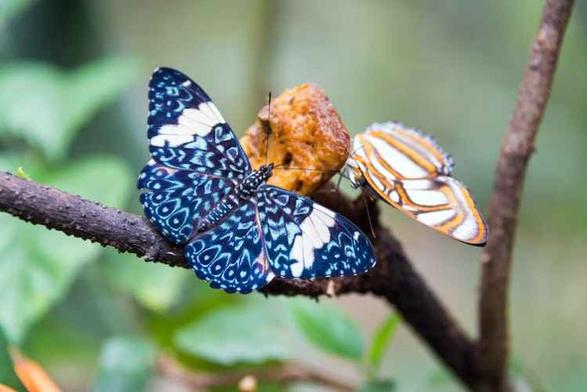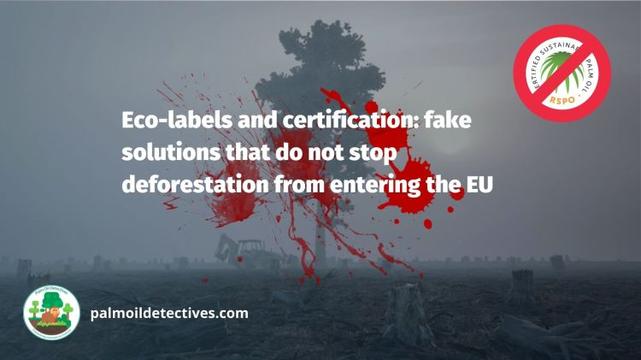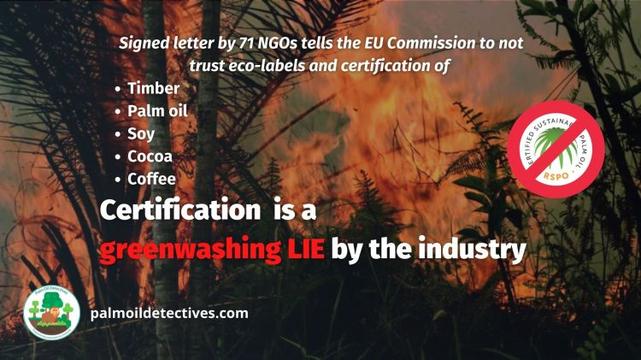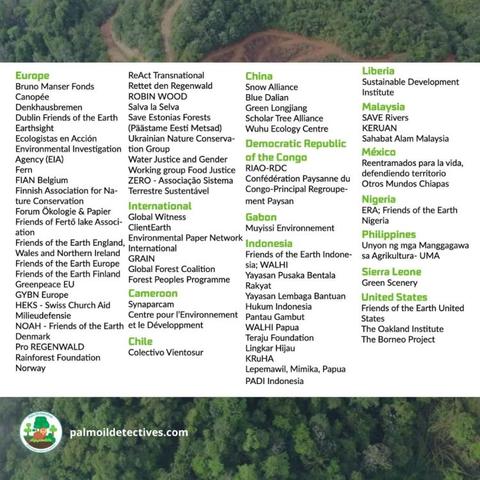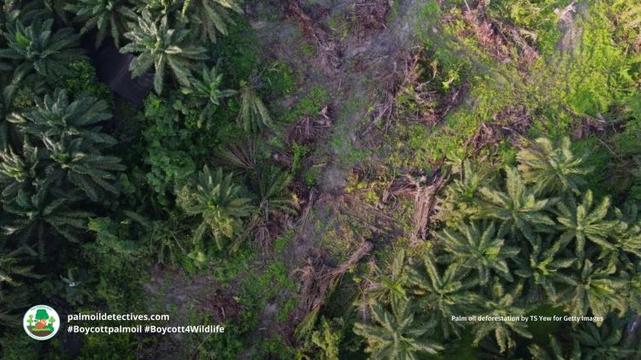Greenwashing Tactic 10: Gaslighting, Harassment, Stalking and Threats
Greenwashing’s most insidious and darkest form is the attempt to discredit, humiliate, harass, abuse and stalk individuals in order to silence individuals and stop them from sharing research and reports with others about corporate corruption, greenwashing and ecocide.
#Greenwashing Tactic 10: #Gaslighting #harassment and threats are used to attempt to discredit critics of an industry, certification scheme or commodity. #Boycottpalmoil #FightGreenwashing @palmoildetect https://palmoildetectives.com/2021/10/27/greenwashing-tactic-10-gaslighting-harassment/
Share to BlueSky Share to Twitter Jump to section
Targets of Abuse
Abusive, Gaslighting and Greenwashing Pro Palm Oil Lobbyists on Twitter
Greenwashing by Gaslighting
Examples of Gaslighting
Greenwashing by Discrediting Critics
Who are the Pro Palm Oil Lobbyists?
Bart W Van Assen – Lead Auditor Trainer for the RSPO
Fraudulent Auditing of RSPO members
Stalking and harassment
Michelle Desilets
Jane Griffiths
Example: Greenwashing with lies, abuse, discrediting whistleblowers
Explore the Series
Further Reading: Greenwashing & Deceptive Marketing
Say thanks for this guide by donating to my Ko-Fi
Targets of Greenwashing by Gaslighting, Abuse, Stalking and Harassment
Targets of this kind of greenwashing could be researchers, conservationists, activists, investigative journalists, whistle-blowers, concerned consumers or brands (both big and small) who have taken a stand against palm oil and refuse to use it in their products.
Anybody who delves too deeply into the inconsistencies, misinformation and corruption in the palm oil industry is a target for this.
This form of greenwashing is not isolated to the palm oil lobby, many other industries apply these dark tactics to cool down criticism online about the environmental damage and ecocide caused by fossil fuels, meat, dairy, timber and extractive open-cut mining.
Targets for this form of greenwashing:
Harassment and abuse has the ability to intimidate and scare some individuals into silence and stop them participating in online conversations or from asking too many questions.
Back to top ↑
Abusive, gaslighting and greenwashing Pro Palm Oil Lobbyists on Twitter:
It is recommend to block all of these people to make your Twitter experience more enjoyable with less palm oil greenwashing, abuse, harassment and hate in your life
Bart Van Assen is the most vile and abusive troll of all. He has harassed me and stalked me in two successive workplaces and has been banned several times from Mastadon and Twitter for harassment and abuse. You can also find him doing the same to other people on Instagram
https://twitter.com/PalmOilDetect/status/1627875314792792064?s=20
Main lobbyists/trolls
Bart W Van Assen: (who juggles multiple accounts to disguise himself: @Apes4Forests and @eachtreematters and @vliegerholland.
Michelle Desilets: @Orangutans and @Orangulandtrust
Jane Griffiths: @griffjane and @newquaySSPO
Lone Droscher Nielson: orangutanland (appears to be a dummy account being run by Michelle Desilets).
Other trolls and fake sock puppet accounts
Anak Sawit: @AnakSawitOrg
Anti genocide: @wakyIIsr
BuleMewak: @Bulemewak
Dupito Simamora: @SimamoraDupito
Earthkeeper22: @Earthkeeper22 parrots the exact same messages as Orangutan Land Trust despite being shown loads of evidence that it is a lie.
Francisca: @sisca_gd
FMN Global: @FMNglobal
Kevin Butler: @kiwibutts
Hypocrite Buster: @hypocrisykiller
Joern Haese: @JoernHaese (pro-Russia troll, apologist for the palm oil industry)
Li May Fun: @LiMayFun
Like I Care: @lik3icar3
Maruli Gultom: @Maruligultom
Najis Keji: @najiskeji
No_Gaslighting: @Ngaslighting
Pax Deorum: @PaxDeorum2 (abusive troll pushing a pro-Russia agenda)
Penny McGregor: @penmcgregor (Disgusting abusive troll who is an apologist for the immensely destructive HS2 project in the UK)
Petani Sawit: @PalmSawit
Peter Ashford: @kaffiene_nz (abusive troll pushing a pro New Zealand dairy/pro palm oil agenda)
ProEqual: @PR03QUAL
Rainforest: @Rainfor60967488
Ray Whitley: @RayWhitley13 (Fake vegan/lobbyist who does not advocate for animals on Twitter but instead simply foments divisiveness and hate on Twitter)
Robert Hii: @HiiRobert
Shite Buster: @Justice4Abo
Via Vallen: @ViaVallenia
Viki: @ImaWereViki
Greenwashing by Gaslighting
Gaslighting is a powerful tool for greenwashing and psychological manipulation. The gaslighter sows seeds of doubt in online conversations from questioning and doubtful researchers and consumers.
Back to top ↑
Gaslighting: What it sounds like, via Reddit A gaslighter will tell individuals that they are wrong and misinformed about the corruption, deforestation, human rights abuses of brands and certification schemes.
That they know far less about an issue than so-called ‘experts’. However, on closer examination, these ‘experts’ are a series of researchers, Zoos or conservation NGOs that are paid by the industry. They produce positive research or ambiguous and inconclusive research that supports their spurious claims of green sustainability.
Examples of gaslighting
Back to top ↑
https://twitter.com/forests4apes/status/1516721955537563648?s=20&t=I9KRnKNOX8wAjpK4d_7n4w
https://twitter.com/palmoiltruther/status/1452516475562909696?s=20
https://twitter.com/Orangutanland/status/1427001793842712578?s=20
https://twitter.com/orangulandtrust/status/1447298891267940353?s=20
https://twitter.com/orangutans/status/1437728818429669380?s=20
https://twitter.com/helloamygarner/status/1455267346298327043?s=20
https://twitter.com/orangulandtrust/status/1451148455435513861?s=20
https://twitter.com/griffjane/status/1256461066512535552?s=20
https://twitter.com/orangutans/status/1445340326290501633?s=20
https://twitter.com/orangutans/status/1201893538109251585?s=20
https://twitter.com/orangutans/status/1452591696789843975?s=20
https://twitter.com/orangutans/status/1429740350739034112?s=20
https://twitter.com/orangulandtrust/status/1355867421429682178?s=20
https://twitter.com/orangutans/status/1351487010758926338?s=20
https://twitter.com/orangutans/status/1265598470368395266?s=20
https://twitter.com/orangulandtrust/status/1259899273304510471?s=20
https://twitter.com/orangulandtrust/status/1464597794279276547?s=20
Back to top ↑
Greenwashing by Discrediting Critics
Discrediting people (especially researchers) who produce evidence of corruption, deforestation, and human rights abuses associated with so-called ‘sustainable’ palm oil.
Back to top ↑
Targets of this form of harassment: researchers, whistleblowers, journalists, activists. Any person (particularly a public figure) who takes a clear and strong stance palm oil, who calls out the corruption of the RSPO and advocates for a palm oil boycott will receive online abuse.
Below: Serial online abuser and greenwasher Michelle Desilets of Orangutan Land Trust cuts and pastes the same response underneath of all tweets calling for a palm oil boycott to attempt to discredit the #Boycottpalmoil #Boycott4Wildlife movement.
Pictured: Serial online abuser and greenwasher Michelle Desilets of Orangutan Land Trust cuts and pastes the same response underneath of all tweets calling for a palm oil boycott to attempt to discredit the evidence I’ve gathered about the RSPO’s corruption.
Other targets of greenwashing by discrediting on social media:
- Dr Roberto Gatti: Lead author of peer-reviewed research showing that “sustainable” palm oil is not sustainable.
- Aurora Sustainability Group: A group of researchers who produced peer-reviewed research showing that “sustainable” palm oil is not sustainable.
- Dr Setia Budhi: Dayak ethnographer who refuses to be cowed or silenced about the immense corruption and indigenous landgrabbing associated with “sustainable” RSPO plantations in Borneo. Read interview and update.
- Craig Jones: Independent photographer who visited an RSPO “sustainable” palm oil plantation in Sumatra (PT Sisirau) and witnessed a mother and baby being rescued from a location of total ecocide – an area illegally destroyed for palm oil – yet “sustainable”. Read this story and the report about the biodiversity of PT Sisirau.
- Isabella Guerrini de Clare: Author of peer-reviewed research showing that “sustainable” palm oil is not sustainable.
- Neue Zurcher Zeitung: Media outlet in Germany that published OSINT satellite data showing incontrovertible and clear evidence of destruction of protected rainforests and within RSPO palm oil plantations.
- Dr Klaus Riede
- Dr Birute Galdikas – the most respected orangutan researcher in the world, who has spent 50 years of her life in the field helping orangutans. She has for decades been a vocal critic against the palm oil industry. One of the few researchers who is brave enough to stand up to large corporations and the RSPO.
- Paul Fraser of Meridian Foods
- and me.
Evidence produced from dozens of different sources over two decades shows the RSPO to be a greenwashing lie that has been a complete failure across all of its own sustainability standards.
Back to top ↑
Examples of this form of harassment
https://twitter.com/palmoiltruther/status/1420376020163596295?s=20
https://twitter.com/orangutans/status/1326100964739330048?s=20
https://twitter.com/AuroraGroupScot/status/1229084035294679040?s=20
https://twitter.com/orangutans/status/1451942650190389251?s=20
https://twitter.com/palmoiltruther/status/1429675933112229889?s=20
https://twitter.com/robertocgatti/status/1408534574167212040
https://twitter.com/orangutans/status/1435918896171823106?s=20
https://twitter.com/orangulandtrust/status/1171018728844038144?s=20
https://twitter.com/orangutans/status/1411683864636964867?s=20
https://twitter.com/orangulandtrust/status/1455645702827225095?s=20
https://twitter.com/RussellMoxham/status/1506851368635703299?s=20&t=96QT7nNMogNmg6VPgOQzUA
https://twitter.com/robertocgatti/status/1293327656642060288?s=20
https://twitter.com/HypocrisyKiller/status/1322862981399547906?s=20
https://twitter.com/IsabellaGuerrin/status/1322692968667598850?s=20
https://twitter.com/palmoiltruther/status/1448164848869675014?s=20
https://twitter.com/palmoiltruther/status/1429707730223259649?s=20
https://twitter.com/orangulandtrust/status/1257282606120546304?s=20
https://twitter.com/orangulandtrust/status/1445673880069099527?s=20
https://twitter.com/palmoiltruther/status/1429159618668687362?s=20
https://twitter.com/IsabellaGuerrin/status/1323405820638482434?s=20
https://twitter.com/palmoiltruther/status/1455070854186995715?s=20
https://twitter.com/orangulandtrust/status/1455651945306263553?s=20
https://twitter.com/robertocgatti/status/1293553785340649478?s=20
https://twitter.com/orangulandtrust/status/1176787367841161216?s=20
https://twitter.com/palmoiltruther/status/1428809813983522819?s=20
https://twitter.com/DrBirute/status/1053460847085801472?s=20
https://twitter.com/AuroraGroupScot/status/1229021993510539265?s=20
https://twitter.com/CraigJones17/status/1437725673754345476?s=20
https://twitter.com/palmoiltruther/status/1421179284140425218?s=20
https://twitter.com/palmoiltruther/status/1455413095011008512?s=20
https://twitter.com/palmoiltruther/status/1457955109363671042?s=20
Back to top ↑
Who are the Pro Palm Oil Lobbyists?
harassing, abusing, stalking, discrediting and gaslighting whistleblowers of corruption, greenwashing and ecocide in the RSPO?
Back to top ↑
Orangutan Land Trust is known by critics of the industry and whistle-blowers of ‘sustainable’ palm oil corruption as the Palm Oil Lies Trust
This charity’s three ‘volunteers’ Bart W Van Assen, Michelle Desilets and Jane Griffiths are responsible for most of the misinformation and greenwashing about the sustainable palm oil on social media.
They confuse unaware consumers and harass critics calling them trolls, sustainability deniers, psychopaths, morons and conspiracy theorists – they behave very professionally. For nearly 20 years they have greenwashed the RSPO’s atrocious record on deforestation, human rights violations and illegal land-grabbing.
Bart Van Assen
Former auditor trainer for the RSPO and FSC, Bart Van Assen juggles various account names on Twitter before getting them banned for abusing people.
Bart has had 3 accounts banned from Twitter: @thewicorman @wildingrocks @bartwvanassen for harassment, abuse and stalking people. As a result of this behaviour, he has also had several police cases opened against him. He even talks in detail about how he stalked palm oil corruption whistleblower @ExposeLies2 on his website: Wilding Rocks. He has abused and harassed countless other people.
He currently uses: @palmoiltruther, @Apes4Forests @Forests4Apes @BartWVanAssen @eachtreematters @vliegerholland on Twitter. In the past, Bart has trained people to undertake audits in order to verify that palm oil plantations adhere to RSPO certified sustainable standards. The RSPO’s audits have been independently verified by different organisations to be fraudulent.
https://twitter.com/PalmOilDetect/status/1627875314792792064?s=20
Bart now harasses on Mastadon using this handle: https://mastodon.green/@wildlingrocks
Bart’s now permanently suspended account on Twitter with the same name
A tweet from Bart Van Assen, former lead auditor for the RSPO and HCV admitting that the main goal of the RSPO, FSC and other certification initiatives is not to prevent deforestation. (Bart has formerly used @palmoiltruther on Twitter but now changes between @Forest4Apes or @Apes4Forests depending on times when he attempts to conceal his identity).
He now has a start-up: Kayon. He is asking people to pay him money to keep trees standing in rainforests scheduled for destruction for palm oil. He calls this ‘pirating a tree’
Bart Van Assen: Former RSPO and FSC Auditor and vile troll on Twitter and Mastadon
Bart Van Assen AKA @palmoiltruther and 3 other banned Twitter accounts @wildingrocks @thewicorman @bartwvanassen, banned for abuse and harassment of people exposing corruption of RSPO so-called ‘sustainable’ palm oil Bart Van Assen Palm Oil Truther Orangutan Land Trust – Harassment and Abuse, getting banned from Twitter Bart Van Assen AKA Wilding Rocks AKA The Wicorman AKA PalmOilTruther harassing people and getting banned from Twitter Bart Van Assen AKA Wilding Rocks AKA The Wicorman AKA PalmOilTruther harassing people and getting banned from Twitter Bart Van Assen AKA Wilding Rocks AKA The Wicorman AKA PalmOilTruther harassing people and getting banned from Twitter Bart Van Assen AKA Wilding Rocks AKA The Wicorman AKA and stalking people from Twitter and getting banned from Twitter Bart Van Assen and Michelle Desilets harass, abuse and attempt to discredit anyone who exposes corruption of the so-called ‘sustainable’ palm oil industry Michelle Desilets threatening and harassing people
Bart Van Assen: Lead Auditor Trainer for the RSPO
and full time greenwasher and online abuser of any person who declares that they want to boycott palm oil
EIA, Global Witness, Human Rights Watch, Sum of Us, Associated Press, Neue Zurcher Zeitung, Channel 4, The Guardian, Yale Environment 360 and ITV, World Health Organisation (WHO) and International Consortium of Investigative Journalists (ICIJ) have consistently produced reports showing that RSPO members continue with human rights abuses, deforestation and illegal land-grabbing and furthermore – that fraudulent auditing is the key reason for this failure of these palm oil companies adhere to the RSPO’s standards.
https://twitter.com/orangulandtrust/status/812266949392601088?s=20
https://twitter.com/EIA_News/status/666229260215033856?s=20
https://twitter.com/SustPalmOil_BE/status/1071051202400538626?s=20
Fraudulent auditing in the RSPO
Many of these reports cite extremely poor auditing is a major reason for the failure of the RSPO. In other words, the auditing process is not, nor has ever been robust enough to prevent human rights abuses, deforestation and illegal indigenous land-grabbing from taking place.
Environmental Investigation Agency (EIA)
“Non-adherence to the RSPO’s standards is systemic and widespread, and has led to ongoing land conflicts, labour abuses and destruction of forests.
“As the world approaches 2020 targets to halt deforestation, the RSPO needs to rapidly implement radical solutions to restore its credibility. We question whether the RSPO is willing and able to rectify its systemic failures – ultimately, voluntary certification is too limited by its voluntary nature.”
— Who Watches the Watchmen Part 2: The continuing incompetence of the RSPO’s assurance systems (2019)
Changing Markets Foundation
“While RSPO is often referred to as the best scheme in the sector, it has several shortcomings; most notably it has not prevented human rights violations and it does not require GHG emissions reductions.”
— The False Promise of Certification (2018)
Greenpeace
“Implementation of [the RSPO’s] standards is often weak, with serious audit failures being reported, many members failing to meet the full range of membership requirements and grievances slow to be addressed.”
— Destruction Certified by Greenpeace (2021)
Environmental Investigation Agency (EIA)
“Without assurance mechanisms that properly function, the RSPO has little credibility and its claims are hollow.
“RSPO companies have continued to be beset
by assurance issues in 2020. Associated Press notably reported on labour violations in Malaysia, including by RSPO members. These allegations included forced labour, the abuse of women and child labour, among others.”
— Burning Questions – Credibility of sustainable palm oil still illusive – Environmental Investigation Agency (2021)
A 2019 World Health Organisation (WHO) report into the palm oil industry and RSPO finds extensive greenwashing of palm oil deforestation and the murder of endangered animals (i.e. biodiversity loss)
Read more RSPO’s annual conference 2019: a focus on faulty audits
It was also acknowledged that the taskforce did not have the capacity to handle the responsibilities that it had set itself, and that besides training, a new model where the work was outsourced might be needed.
In ending the session, the panelists identified the most important things that would kickstart better assurance, namely: obtaining feedback to improve the assurance system, formulating better social policy, improved communications, rigour in meeting deadlines, and maintaining credible audits.
RT Report 2019
Back to top ↑
Read more
Kirby, David (2015) Sustainable Palm Oil? Who Knows, Thanks to Derelict Auditors, Take Part
Lang, Chris & REDD Monitor (2015) Sustainable palm oil? RSPO’s greenwashing and fraudulent audits exposed. Ecologist: Informed by Nature.
Vit, Jonathan (2015) Greenwashing? RSPO audits rife with ‘mistakes and fraud,’ report finds. Mongabay.
https://twitter.com/VanessaFiji/status/1343842368915726337?s=20
https://twitter.com/palmoiltruther/status/1448162583958151169?s=20
https://twitter.com/palmoiltruther/status/1463139065289601027?s=20
https://twitter.com/palmoiltruther/status/1423973381292974085?s=20
https://twitter.com/palmoiltruther/status/1420996831857762305?s=20
https://twitter.com/palmoiltruther/status/1445783304213434383?s=20
https://twitter.com/orangutans/status/1430184928898080776?s=20
https://twitter.com/orangutans/status/1452580747320102912?s=20
https://twitter.com/palmoiltruther/status/1452529559883051008?s=20
Back to top ↑
Michelle Desilets
Executive Director of Orangutan Land Trust Michelle Desilets manages both the @orangutans and @orangulandtrust accounts on Twitter.
- Michelle Desilets threatening and harassing people
- Michelle Desilets threatening and harassing people
- Michelle Desilets threatening and harassing people
- Michelle Desilets threatening and harassing people
- Bart Van Assen AKA Wilding Rocks AKA The Wicorman AKA PalmOilTruther harassing people and getting banned from Twitter
- Michelle Desilets at the RSPO conference
https://twitter.com/orangutans/status/1423218195847172098?s=20
https://twitter.com/orangutans/status/1434147701671829509?s=20
https://twitter.com/orangutans/status/1452980378394824711?s=20
https://twitter.com/orangutans/status/1360920014619095040?s=20
https://twitter.com/orangutans/status/1333720262655815681?s=20
https://twitter.com/orangulandtrust/status/1451148455435513861?s=20
https://twitter.com/orangulandtrust/status/1436350934108495873?s=20
Back to top ↑
Jane Griffiths
@griffjane and @NewQuaySSPO
Jane is a ‘volunteer’ for Orangutan Land Trust, rarely does she openly harass or abuse people, however she does jump to most conversations about palm oil and gaslights and generates doubt. She casts doubt by citing the partnership of the World Association of Zoos and Aquariums (WAZA) and the RSPO and an approval of the RSPO from David Attenborough in the form of a handwritten letter.
https://twitter.com/griffjane/status/1451532542436335621?s=20
https://twitter.com/griffjane/status/1452310144671436807?s=20
https://twitter.com/orangutans/status/1451535516344672258?s=20
https://twitter.com/griffjane/status/1256461066512535552?s=20
Back to top ↑
Example: Greenwashing with lies, abuse, discrediting whistleblowers
Craig Jones, one of the most respected photojournalists in Britain recorded a mother and baby close to death on an RSPO palm oil plantation – PT Sisirau in 2012
He was later told that he needed to hold off on releasing the photos of this hellish scene until after the RSPO conference.
He recalls it here
Read story Back to top ↑
Bart and Michelle claim that Craig was lying about this, that PT Sisirau was not an RSPO member palm oil plantation. The problem with that accusation is that there is public evidence from the RSPO’s own website which shows that this is a blatant lie.
A complaint was made to the RSPO by Helen Buckland, personal friend of Michelle Desilets and Director of OrangutanSOS. She attempted to prevent Craig from publishing the deeply horrific images until after the RSPO conference that year. The RSPO took a full year to send investigators to the plantation to examine the situation. The complaint, meeting minutes and report is below.
Michelle Desilets who conducts greenwashing for the RSPO in her ‘volunteer’ role for Orangutan Land Trust is also on the Complaints Panel for the RSPO. She investigates complaints of human rights and labour abuses, illegal land-grabbing, ecocide and illegal deforestation on RSPO palm oil plantations. She was part of the decision-making on PT Sisirau, so her tweets are a blatant lie that has been caught out.
Back to top ↑
A letter advising of the cancellation of PT Sisrau’s RSPO membership following the incident of illegal deforestation and orangutan harm, documented by Craig Jones. Meeting minutes from a Complaints Panel for the RSPO – which features Michelle Desilets on the panel.
Despite the presence of some threatened species, the area has an impoverished animal community. It is useful to look at the families that are missing. There were no tracks of: scavenging viverrids, arboreal squirrels and tupaiids and tragulids. All these would be expected in scrub and agricultural areas.
There were no overflying ardeids and other water birds from the nearby coastal wetland areas. No overflying hornbills from the adjacent from the nearby protected forests. In the scrub and secondary areas there were no drongos, flowerpeckers, starlings, flycatchers and babblers living off the local insects and fruit. There was a single cuckoo calling and no calls from barbets. And despite being a palm growing area, there were no parrots and no aerial feeding swifts.
The area within the project site and beyond in the Gunung Leuser Ecosystem area was extensively disturbed and clearance removed most of the low mobility, forest dependent species in the project site and beyond.
PT Sisirau’s compliance to the RSPO’s Sustainable Palm Oil Principles
Back to top ↑
Explore the series
1 2 3 4 5 6 7 8 9 10
Join the #Boycott4Wildlife #Boycottpalmoil and fight deforestation and greenwashing by using your wallet as a weapon!
Find out more Back to top ↑
Further reading on palm oil ecocide, greenwashing and deceptive marketing
A Brief History of Consumer Culture, Dr. Kerryn Higgs, The MIT Press Reader. https://thereader.mitpress.mit.edu/a-brief-history-of-consumer-culture/A Deluge of Double-Speak (2017), Jason Bagley. Truth in Advertising. https://truthinadvertising.org/blog/a-deluge-of-doublespeak/Aggarwal, P. (2011). Greenwashing: The darker side of CSR. Indian Journal of Applied Research, 4(3), 61-66. https://www.worldwidejournals.com/indian-journal-of-applied-research-(IJAR)/article/greenwashing-the-darker-side-of-csr/MzMxMQ==/?is=1Anti-Corporate Activism and Collusion: The Contentious Politics of Palm Oil Expansion in Indonesia, (2022). Ward Berenschot, et. al., Geoforum, Volume 131, 2022, https://doi.org/10.1016/j.geoforum.2022.03.002Armour, C. (2021). Green Clean. Company Director Magazine. https://www.aicd.com.au/regulatory-compliance/regulations/investigation/green-clean.htmlBalanced Growth (2020), In: Leal Filho W., Azul A.M., Brandli L., özuyar P.G., Wall T. (eds) Responsible Consumption and Production. Encyclopedia of the UN Sustainable Development Goals. Springer, ChamBerenschot, W., Hospes, O., & Afrizal, A. (2023). Unequal access to justice: An evaluation of RSPO’s capacity to resolve palm oil conflicts in Indonesia. Agriculture and Human Values, 40, 291-304. https://doi.org/10.1007/s10460-022-10360-zCarlson, K. M., Heilmayr, R., Gibbs, H. K., Noojipady, P., et al. (2018). Effect of oil palm sustainability certification on deforestation and fire in Indonesia. PNAS, 115(1), 121-126. https://doi.org/10.1073/pnas.1704728114Cazzolla Gatti, R., Liang, J., Velichevskaya, A., & Zhou, M. (2018). Sustainable palm oil may not be so sustainable. Science of The Total Environment, 652, 48-51. https://pubmed.ncbi.nlm.nih.gov/30359800/Changing Times Media. (2019). Roundtable on Sustainable Palm Oil is ‘greenwashing’ labelled products, environmental investigation agency says. Changing Times Media. https://changingtimes.media/2019/11/03/roundtable-on-sustainable-palm-oil-is-greenwashing-labelled-products-environmental-protection-agency-says/Client Earth: The Greenwashing Files. https://www.clientearth.org/projects/the-greenwashing-files/Commodifying sustainability: Development, nature and politics in the palm oil industry (2019). World Development, Volume 121, September 2019, Pages 218-228. https://ideas.repec.org/a/eee/wdevel/v121y2019icp218-228.htmlContrasting communications of sustainability science in the media coverage of palm oil agriculture on tropical peatlands in Indonesia, Malaysia and Singapore (2020). Liu, F. H. M., Ganesan, V., Smith, T. E. L. Environmental Science & Policy, 114. https://www.researchgate.net/publication/343772443_Contrasting_communications_of_sustainability_science_in_the_media_coverage_of_palm_oil_agriculture_on_tropical_peatlands_in_Indonesia_Malaysia_and_SingaporeCosimo, L. H. E., Masiero, M., Mammadova, A., & Pettenella, D. (2024). Voluntary sustainability standards to cope with the new European Union regulation on deforestation-free products: A gap analysis. Forest Policy and Economics, 164, 103235. https://doi.org/10.1016/j.forpol.2024.103235Dalton, J. (2018). No such thing as sustainable palm oil – ‘certified’ can destroy even more wildlife, say scientists. The Independent. https://www.independent.co.uk/climate-change/news/palm-oil-sustainable-certified-plantations-orangutans-indonesia-southeast-asia-greenwashing-purdue-a8674681.htmlDavis, S. J., Alexander, K., Moreno-Cruz, J., et al. (2023). Food without agriculture. Nature Sustainability. https://www.nature.com/articles/s41893-023-01241-2EIA International. (2022). Will palm oil watchdog rid itself of deforestation or continue to pretend its products are sustainable? EIA International. https://eia-international.org/news/will-palm-oil-watchdog-rid-itself-of-deforestation-or-continue-to-pretend-its-products-are-sustainable/Environmental Investigation Agency. (2019). Palm oil watchdog’s sustainability guarantee is still a destructive con. EIA International. https://eia-international.org/news/palm-oil-watchdogs-sustainability-guarantee-is-still-a-destructive-con/Federal Trade Commission. (n.d.). Green Guides. https://www.ftc.gov/news-events/topics/truth-advertising/green-guidesFifteen environmental NGOs demand that sustainable palm oil watchdog does its job (2019). Rainforest Action Network. https://www.ran.org/press-releases/fifteen-environmental-ngos-demand-that-sustainable-palm-oil-watchdog-does-its-job/ Friends of the Earth International. (2018). RSPO: 14 years of failure to eliminate violence and destruction from the industrial palm oil sector. Friends of the Earth International. https://www.foei.org/rspo-14-years-of-failure-to-eliminate-violence-and-destruction-from-the-industrial-palm-oil-sector/Lang, Chris and REDD Monitor. Sustainable palm oil? RSPO’s greenwashing and fraudulent audits exposed. The Ecologist. https://theecologist.org/2015/nov/19/sustainable-palm-oil-rspos-greenwashing-and-fraudulent-audits-exposedGatti, L., Pizzetti, M., & Seele, P. (2021). Green lies and their effect on intention to invest. Journal of Business Research, 127, 376-387. https://doi.org/10.1016/j.jbusres.2021.01.028Global Witness. (2023). Amazon palm: Ecocide and human rights abuses. Global Witness. https://www.globalwitness.org/en/campaigns/environmental-activists/amazon-palm/Global Witness. (2021). The True Price of Palm Oil. Global Witness. https://www.globalwitness.org/en/campaigns/forests/true-price-palm-oil/Grain. (2021). Ten reasons why certification should not be promoted in the EU anti-deforestation regulation. Grain. https://grain.org/en/article/6856-ten-reasons-why-certification-should-not-be-promoted-in-the-eu-anti-deforestation-regulationGreen Clean (2021). Armour, C. Company Director Magazine.Green marketing and the Australian Consumer Law (2011). Australian Competition and Consumer Commission. https://www.accc.gov.au/system/files/Green%20marketing%20and%20the%20ACL.pdfGreenwash and spin: palm oil lobby targets its critics (2011). Helan, A. Ecologist: Informed by Nature. https://theecologist.org/2011/jul/08/greenwash-and-spin-palm-oil-lobby-targets-its-criticsGreenwashing: definition and examples. Selectra https://climate.selectra.com/en/environment/greenwashing#:~:text=Greenwashing%20is%20the%20practice%20of,its%20activities%20pollute%20the%20environment.Greenwashing of the Palm Oil Industry (2007). Mongabay. https://news.mongabay.com/2007/11/greenwashing-the-palm-oil-industry/Group Challenges Rainforest Alliance Earth-Friendly Seal of Approval (2015). Truth in Advertising. https://www.truthinadvertising.org/group-challenges-rainforest-alliance-earth-friendly-seal-of-approvalHelan, A. (2011). Greenwash and spin: palm oil lobby targets its critics. Ecologist: Informed by Nature. https://theecologist.org/2011/feb/15/greenwash-and-spin-palm-oil-lobby-targets-its-criticsHewlett Packard. (2021). What is Greenwashing and How to Tell Which Companies are Truly Environmentally Responsible. Hewlett Packard. https://www.hp.com/us-en/shop/tech-takes/what-is-greenwashing-environmentally-responsible-companiesHolzner, A., Rameli, N. I. A. M., Ruppert, N., & Widdig, A. (2024). Agricultural habitat use affects infant survivorship in an endangered macaque species. Current Biology. https://pubmed.ncbi.nlm.nih.gov/38194972/How Cause-washing Deceives Consumers (2021). Truth in Advertising. https://truthinadvertising.org/resource/how-causewashing-deceives-consumers/International Labour Organization. (2020). Forced labor in the palm oil industry. ILO. https://www.ilo.org/topics/forced-labour-modern-slavery-and-human-traffickingJauernig, J., Uhl, M., & Valentinov, V. (2021). The ethics of corporate hypocrisy: An experimental approach. Futures, 129, 102757. https://doi.org/10.1016/j.futures.2021.102757Kirby, D. (2015). Sustainable Palm Oil? Who Knows, Thanks to Derelict Auditors. Take Part. https://www.yahoo.com/news/sustainable-palm-oil-knows-thanks-derelict-auditors-200643980.htmlLi, T. M., & Semedi, P. (2021). Plantation life: Corporate occupation in Indonesia’s oil palm zone. Duke University Press. https://www.dukeupress.edu/plantation-lifeLiu, F. H. M., Ganesan, V., & Smith, T. E. L. (2020). Contrasting communications of sustainability science in the media coverage of palm oil agriculture on tropical peatlands in Indonesia, Malaysia, and Singapore. Environmental Science & Policy, 114. https://www.researchgate.net/publication/343772443_Contrasting_communications_of_sustainability_science_in_the_media_coverage_of_palm_oil_agriculture_on_tropical_peatlands_in_Indonesia_Malaysia_and_Singapore Meemken, E. M., Barrett, C. B., Michelson, H. C., et al. (2021). Sustainability standards in global agrifood supply chains. Nature Food. https://doi.org/10.1038/s43016-021-00299-2Miles, T. (2019). Study in WHO journal likens palm oil lobbying to tobacco and alcohol industries. Reuters. https://www.reuters.com/article/idUSKCN1P21ZR/Nygaard, A. (2023). Is sustainable certification’s ability to combat greenwashing trustworthy? Frontiers in Sustainability, 4, Article 1188069. https://doi.org/10.3389/frsus.2023.1188069Oppong-Tawiah D, Webster J. Corporate Sustainability Communication as ‘Fake News’: Firms’ Greenwashing on Twitter. Sustainability. 2023; 15(8):6683. https://www.mdpi.com/2071-1050/15/8/6683Pabon, J. (2024). The great greenwashing: How brands, governments, and influencers are lying to you. Anansi International. https://www.vitalsource.com/products/the-great-greenwashing-john-pabon-v9781487012878Podnar, K., & Golob, U. (2024). Brands and activism: Ecosystem and paradoxes. Journal of Brand Management, 31, 95–107. https://link.springer.com/article/10.1057/s41262-024-00355-yRainforest Action Network. (2019). Fifteen environmental NGOs demand that sustainable palm oil watchdog does its job. RAN. https://www.ran.org/press-releases/fifteen-environmental-ngos-demand-that-sustainable-palm-oil-watchdog-does-its-job/Renner, A., Zellweger, C., & Skinner, B. (2021). ‘Is there such a thing as sustainable palm oil? Satellite images show protected rainforest on fire’. Neue Zürcher Zeitung. https://www.nzz.ch/english/palm-oil-boom-threatens-protected-rainforest-in-indonesia-ld.1625490Saager, E. S., Iwamura, T., Jucker, T., & Murray, K. A. (2023). Deforestation for oil palm increases microclimate suitability for the development of the disease vector Aedes albopictus. Scientific Reports, 13(1), 9514. https://www.nature.com/articles/s41598-023-35452-6Southey, F. (2021). What do Millennials think of palm oil? Nestlé investigates. Food Navigator. https://www.foodnavigator.com/Article/2021/08/12/What-do-Millennials-think-of-palm-oil-Nestle-investigatesTransparency International. (2023). Transparency international report: Corruption and corporate capture in Indonesia’s top 50 palm oil companies. Transparency International. https://palmoildetectives.com/2023/05/14/transparency-international-report-corruption-and-corporate-capture-in-indonesias-top-50-palm-oil-companies/Truth in Advertising. (2022). Companies accused of greenwashing. https://truthinadvertising.org/articles/companies-accused-greenwashing/Truth in Advertising. (n.d.). How causewashing deceives consumers. https://truthinadvertising.org/resource/how-causewashing-deceives-consumers/Tybout, A. M., & Calkins, T. (Eds.). (2019). Kellogg on Branding in a Hyper-Connected World. Kellogg School of Management, Northwestern University. https://www.wiley.com/en-au/Kellogg+on+Branding+in+a+Hyper-Connected+World-p-9781119533184Wicke, J. (2019). Sustainable palm oil or certified dispossession? NGOs within scalar struggles over the RSPO private governance standard. Bioeconomy & Inequalities: Working Paper No. 8. https://www.bioinequalities.uni-jena.de/sozbemedia/WorkingPaper8.pdfWorld Health Organisation. (2019). The palm oil industry and noncommunicable diseases. World Health Organisation Bulletin, 97, 118-128. https://pubmed.ncbi.nlm.nih.gov/30728618/World Rainforest Movement. (2021, November 22). Why the RSPO facilitates land grabs for palm oil. https://wrm.org.uy/articles-from-the-wrm-bulletin/section1/why-the-rspo-facilitates-land-grabs-for-palm-oil/Zuckerman, J. (2021). The Time Has Come to Rein In the Global Scourge of Palm Oil. Yale Environment 360, Yale School of Environment. https://e360.yale.edu/features/the-time-has-come-to-rein-in-the-global-scourge-of-palm-oil Back to top ↑
Contribute to my Ko-Fi
Did you enjoy visiting this website?
Palm Oil Detectives is 100% self-funded
Palm Oil Detectives is completely self-funded by its creator. All hosting and website fees and investigations into brands are self-funded by the creator of this online movement. If you like what I am doing, you and would like me to help meet costs, please send Palm Oil Detectives a thanks on Ko-Fi.
Say thanks on Ko-Fi Back to top ↑
#10 #advertising #Boycott4wildlife #BoycottPalmOil #branding #consumerBoycott #consumerRights #consumerism #corporateCapture #Fightgreenwashing #Gaslighting #greenwash #greenwashing #harassment #lobbying #OrangutanLandTrust #ResistGreenwashing #RSPO #RSPOGreenwashing #stalking













